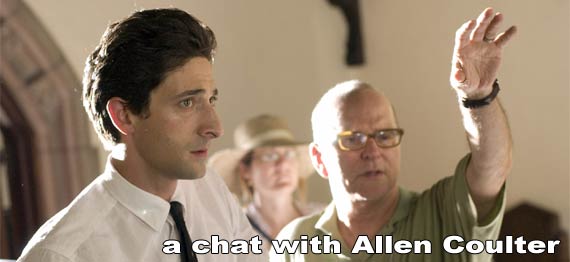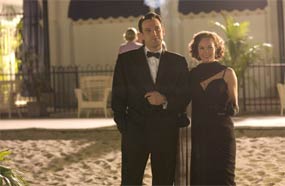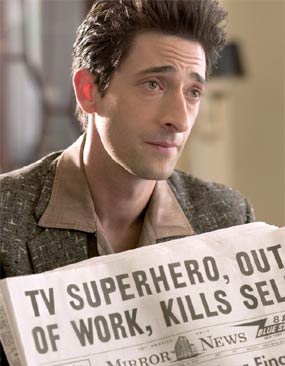
01/29/2007
Movies Home / Entertainment Channel / Bullz-Eye Home
One of the most talked-about films of 2006 – for all the right reasons, fortunately – was "Hollywoodland" (on DVD Feb. 6), which explored the death of actor George Reeves, best known for playing TV's Superman in the 1950s. For years, Reeves’ death has been under scrutiny by conspiracy theorists who’ve claimed that it wasn’t suicide, as declared by the Los Angeles Police Department, but, rather, murder…and there were more possible suspects than you might suspect. Bullz-Eye had a chance to chat with the film’s director, Allen Coulter, about his experiences on “Hollywoodland” (including whether he hesitated at all before casting Ben Affleck as Reeves) as well as his work behind the camera for such HBO series as “The Sopranos,” “Six Feet Under,” "Rome," and “Sex and the City.”
Allen Coulter: Hi, Will.
Bullz-Eye: Hi, Allen. How’s it going?
AC: Good, good.
BE: Well, I’ve seen “Hollywoodland” – Craig (the Universal rep) kindly sent me a screener – and very much enjoyed it.
AC: Good. I’m glad. That’ll keep this from being quite so awkward, then.
BE: Exactly. So, how familiar were you with the whole George Reeves saga before you came aboard the picture?
AC: You know, truthfully, not very. I mean, I knew that he had allegedly killed himself after the series ended, but beyond that…the whole long-term affair with Toni Mannix, and her background and the fact that she was married to one of the heads of MGM, all of that was news to me.
BE: What was it in particular that caught your eye about the script?
AC: Well, I mean, I still remember reading it the first time. It was a great milieu; it was a story that was immediately interesting because, I mean, I certainly knew who Reeves was and I knew the mythology, but to see behind the scenes, to have someone kind of pull the curtain back and allow me to peek behind it was, you know, pretty compelling. And, then, although the detective story changed somewhat, I thought the original writer, Paul Birnbaum, had found an interesting idea into the story through this detective, so you weren’t stuck with strictly a biopic. Which was a risk, but I happened to believe in that. That this was a way to see things that we couldn’t have seen otherwise.
BE: Yeah, actually, I was going to ask you if the fact that Adrien Brody’s character was less a real person than a script device gave you pause at all.
AC: Well, it did a little bit. I mean, it certainly… (Pauses) Let’s put it this way. When I read it, it didn’t. When I thought about it, I thought, well, is this okay? And then I decided that there was something about being able to have a character who not only can witness things that we couldn’t witness, and it would take it away, obviously, from being a strict biopic which could’ve just as well shown on A&E or something. No slight to them, but I wasn’t interested in doing just a biopic. Plus, it gave us someone who could have an emotional response to the situation, especially if his story somehow reverberated with the George Reeves story, which is what I tried to do to the script when I got involved: to see that Louis Simo’s story had its own variation on this same theme of a man who wants to be something other than who he is.
BE: Ben Affleck is fantastic as Reeves, but did you have any trouble envisioning him in the role, given that the last couple of years haven’t exactly found him, uh, stretching his acting ability?
AC: (Laughs) Yeah, well, you know, I had no more trouble than I would with any actor for a role that I’ve never seen them do. It was different from anything he’s done…but, in a way, so was the role that Diane (Lane) did. Now, that gave me pause because she’d never played a woman who was quite so ballsy, you know? She’s always…well, not always, but 90% of the time, she’s played women who are somehow victimized, and in this case, she really, truly does not behave like a victim. And it was a different kind of performance in many ways for Diane…although I’m not sure it’s so recognizable as such. But the truth is, it was quite unusual for her. And Adrien, too, playing kind of a romantic lead rather than a kind of character, which is what most of the work he’s done has been. I had the same hesitation there. So it was no different with Ben. I’d just never seen him do anything like this. I didn’t really look at his past…or Diane’s, or Adrien’s …beyond the fact that they had not done this kind of work.
BE: My editor enjoyed the movie, too, but he also said it should be a sin to put makeup on Diane Lane to make her look older.
AC: Well, you know? He’s right! (Laughs) It was heartbreaking! But I will say that she encouraged that, which was, I think, a real tribute to how serious she is as an actress, and how un-egotistical she is. She’s really a very self-effacing, extraordinarily charming and lovely woman who really encouraged that…and the truth is, that’s why it’s even more daring than it appears on the surface. We started aging her pretty quickly, but in such subtle ways that, once, someone asked me, “Why did you light her so harshly and make her look so much older?” Well, the truth is, we were aging her pretty much from shortly after the scene where she and George meet. We started aging her…and very subtly, so that that last moment, when you see truly aged, would not come as kind of a fictitious change, but would seem like, “Wow, I didn’t notice (how much she’d been aging),” but it wasn’t extraordinary. Had we not aged her like that, that would’ve seemed false. So we were actually aging her in a way which, for an egotistical actress, would’ve been a problem…because we did it in a way where you couldn’t really tell we were aging her. So I agree that it was sinful…but it was necessary. (Laughs)
 BE: About halfway through the film, my wife turned
to me and said, “Oh, no, don’t tell me this is another one of those movies
where nobody really knows what happened and it’s all just a bunch of
theories.”
BE: About halfway through the film, my wife turned
to me and said, “Oh, no, don’t tell me this is another one of those movies
where nobody really knows what happened and it’s all just a bunch of
theories.”
AC: Uh-oh. (Laughs)
BE: Did you have any hesitation about approaching because so much of what’s onscreen is a collection of theories?
AC: No…because we don’t know what happened! We would be lying – even to your wife! – if we were to say, “This is what happened.” No one knows. There are even those who believe that what happened is exactly what it appears: that he simply committed suicide. Which would include the police at the time…or, at least, the police on record. A number of people, anyway. But I would say that for every person who believes that, there’s somebody who believes absolutely in one of these conspiracy theories. So the truth was that we don’t know…though – and this may be me splitting hairs – very clearly, Louis Simo, at the end, witnesses what he thinks happened. That is to say, his version is that final moment with George, when he seems so hopeless, and no one enters the room and, although you don’t witness the actual shot…because Louis didn’t…we know, I think, that that’s what he’s thinking: that this man had reached a dead end. And so, in that sense, we do suggest what the protagonist believes…which is, generally, what the filmmakers believe. (Pauses) You can tell that to your wife, by the way, but I’m sure she won’t buy it. (Laughs)
BE: Well, we’ll see. (Laughs) By the way, the bit on the black and white film, with Reeves practicing his moves, was heartbreaking.
AC: Good!
BE: Was that indeed based in reality?
AC: Yes. That’s actually almost an exact duplicate of the real film that we saw. It is heartbreaking and depressing, and we felt that was the turning point for Lewis Simo…that when he sees that, he thinks, “Oh, man.” As Bob Hoskins said, “If they didn’t shoot him, they should’ve, just to put him out of his misery.”
BE: Now, you were doing predominantly TV work prior to this. I’m guessing you picked up some of the skills you used to create the dark feel on “Hollywoodland” when you worked on “Millennium.”
"I’ve been very fortunate to work on things, by and large, that gave me a great deal of freedom in terms of how I wanted to shoot and so on."AC: (Laughs) Well, yeah, I mean, “Millennium” is pretty dark. It’s pretty grim. You know, all the work I’ve done seems partially dictated by just the kinds of things I responded to and went after to do, whether it was “The Sopranos” – which has a little bit of a kind of contemporary noir feel to it – or “Millennium,” as you say…or even “The X-Files.” You know, I think they were all… (Pauses) Directors tend to respond – at least, I do – to certain kinds of material, and there’s probably a pattern there that I’m not even aware of that this belongs to.
BE: It seems like you must’ve been pretty high up on HBO’s rolodex, given the number of their shows you’ve worked on.
AC: (Laughs) Yeah, I guess that’s true. I feel very fortunate, especially when they choose to film a series in Rome! It’s very hard to complain!
BE: Was it difficult making the jump from television to feature films?
AC: You know, not at all. Not even slightly. But, you know, that’s partially because the types of television (shows) I’ve done are very close to features. I mean, “The Sopranos,” it’s just a stone’s throw from “The Sopranos” to a feature, you know. And, really, even “Millennium” is more sort of cinematic, if you will. More film-like. Horror film, but, still, film-like. And “X-Files.” So I’ve been very fortunate to work on things, by and large, that gave me a great deal of freedom in terms of how I wanted to shoot and so on. For years now, I’ve worked more or less in the same way, in terms of how I prepare, so I didn’t really change how I prepared or anything from when I did the shows. Honestly, the only difference was that I had more authority and more creative control…because in television, as you may know, the ultimate creative decisions are made by the creator, writer, and producer, or some combination of those, and not the director. So to have that control was a nice kind of change of pace.
BE: And since the Internet Movie Database is never wrong…
AC: (Makes a scoffing sound)
BE: …I wanted to ask about the fact that they have you listed as First Assistant Director on a 1978 film called “The Great Bank Hoax.”
AC: (Hesitates) That’s correct…
BE: Okay.
AC: …which is kind of astounding. But, yeah, that was an early job for me. I was…I wasn’t the first A.D; I was an additional assistant director. I’m surprised that they discovered; that’s not something I would ordinarily reveal to the public.
BE: Oops.
AC: You know, it was one of those early jobs you do when you don’t know anything.
BE: It looks like an interesting cast: Richard Basehart, Burgess Meredith, Ned Beatty…
AC: The best thing about that film…oh, well, yes, it was an interesting cast. And Arthur Godfrey was in it as well, by the way. Basehart was very…sadly, my memory of Basehart was seeing him drive into the hotel where we were all staying at five in the morning, exhausted, because he’d been with two people who gotten drunk and left him as their driver in Atlanta…and he didn’t know Atlanta. So he’d spent all night trying to find the hotel. That’s my memory of Richard Basehart, unfortunately.
BE: What was Arthur Godfrey like?
AC: (Instantly) He was a curmudgeon.
BE: (Laughs)
 AC: He was the last person that any child would want
to sit in the lap of. But, you know, he was Arthur Godfrey, so that,
in and of itself, was unique.
AC: He was the last person that any child would want
to sit in the lap of. But, you know, he was Arthur Godfrey, so that,
in and of itself, was unique.
BE: It now occurs to me that I’ve asked about Arthur Godfrey, and virtually everyone who reads this site is going to go, “Who the hell’s Arthur Godfrey?”
AC: Well, they’re just gonna have to go Google him, then. (Writer’s note: Or you can just click here.) Because you’re right, they’re not gonna have a clue.
BE: And I saw on IMDb that you’re working on what they refer to as an otherwise-untitled “Glenn Close TV Project.”
AC: Yeah, I just came from there this moment…literally came up from the studio. Yeah, we’re shooting a pilot. I’m doing a pilot for FX that I’m shooting next week, written by Todd and Glenn Kessler (“The Sopranos”) – who are brothers – and Daniel Zelman. They’re the writers and producers of the show…and it’s still untitled. It’s a legal…thriller, they’re calling it…for FX. It’s FX’s answer to the legal genre…which, knowing FX, as you might imagine, is a completely unique take on what that might be. It’s far more of a thriller and there’s no immediate resolution, no jury…there’s not even a courtroom scene in my episode, the pilot episode. It’s 13 shows, and it covers one case that this high-stakes litigator, played by Glenn Close, takes on, but it follows in a very unusual way the rather duplicitous and complicated path that she’s on to nail this guy. But it’s much more of a thriller, in sort of an “Insider” sort of way.
Craig from Universal: Will, do you have one more question?
BE: Just to ask if there are any other projects that you have your eye on that you can discuss?
AC: Well, I wish! I mean, there’s an old project I was involved with, with Jersey Films, that still interests me called “Lost Girls”…but, unfortunately, Jersey as we know it evolved or disappeared or became something else and morphed into a different organization. So I’ve been kind of looking into that, to see if that can be revived. And, my agent – Paul Alan Smith, who’s now with ICM – is actively reading scripts, along with my assistant, to see if we can find another movie…which we have not yet found.
BE: Excellent. Well, it’s been a pleasure talking to you!
AC: You, too. Thanks a lot, Will!
You can follow us on Twitter and Facebook for content updates. Also, sign up for our email list for weekly updates and check us out on Google+ as well.







